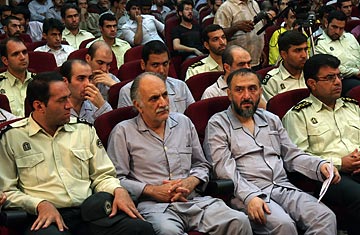
Iranian cleric Mohammad Ali Abtahi, second from right, sits in a courtroom with other defendants, wearing gray, in Tehran
On Sunday, Iran's state TV broadcast a wrenching and stunning 20-minute confession from a well-known public figure. But former Vice President Mohammad Ali Abtahi, a reformist cleric, was clearly not himself. For one, he was not allowed to wear his clerical robe, and he had lost visible weight. "I believe the reformists had prepared for two or three years for this election in order to limit the powers of the Supreme Leader," he declared, reading from a piece of paper. He went on to accuse three opposition leaders of forming an alliance in which they "promised to always back each other up" in their efforts to rob the presidency from the legitimate winner, President Mahmoud Ahmadinejad.
Amid the turmoil following the controversial June 12 presidential election, Iran's ruling hard-liners have escalated their showdown with the opposition by putting more than 100 political dissidents on what many outside the regime have denounced as a show trial. Among those "confessing" so far has been a reporter for Newsweek, Maziar Bahari, a Canadian citizen of Iranian descent, who said the foreign media helped cause the chaos following the vote. However, the regime's intentions can be seen from the array of political figures on trial, including several Deputy Ministers, a deputy speaker of parliament and many current advisers to opposition leaders. The regime is building a case against their bosses, some of the most powerful political figures in Iran.
That was evident from Abtahi's recitation. Clutching a white piece of paper, Abtahi said, "After the election [reformist former President Mohammed] Khatami and [Hashemi] Rafsanjani had sworn to have each other's back, and I don't understand the point of it, knowing the difference [in votes between Ahmadinejad and Mir-Hossein Mousavi] was 11 million ... Hashemi [Rafsanjani] wanted to take revenge on Ahmadinejad and the Supreme Leader." Abtahi's voice lowered when he mentioned Rafsanjani, who is believed to be the most powerful backer of the opposition and its protests.
Mousavi, Khatami and, most significantly, Rafsanjani, possess extensive revolutionary credentials, having served under the Islamic Republic's founder, Ayatullah Ruhollah Khomeini. They cannot be easily arrested. In the eyes of the ruling hard-liners, then, the road to the triumvirate must go through the Tehran courtroom.
Already on that Sunday, there were signs on the streets of Tehran that a harsh public campaign against Rafsanjani, Khatami and Mousavi was being orchestrated. Stacks of copies of the ultraconservative newspaper Kayhan blasted the headline "Evidence of Mousavi's Betrayal of Iran Exposed!" The newspaper, a favored mouthpiece for Supreme Leader Ayatullah Ali Khamenei, went on to call for the trial of Khatami and Mousavi for "acting against God," a crime punishable under Shari'a law by death. An expanding witch hunt would be reminiscent of a massive purge of dissidents in 1988, when thousands of leftist political prisoners were executed for being kafirs, or infidels.
Hard-line rhetoric heated up soon after the trials began. "Today's confession has opened the way to dealing with the leaders of the unrest," Hamid Resaee, a conservative lawmaker, told the state news agency IRNA. "There is no longer any reason to tolerate or compromise." Hard-line cleric Elias Naderan was even more explicit: "Those within the inner circle who managed the unrest must be put on trial. We shouldn't chase after weak, second-class figures with no influence."
On the streets of the country's capital, residents were abuzz with talk of the unexpected size and ferocity of the mass trial. "This is simply unprecedented," said a resident of north Tehran. "It's surprising how many are on trial." Just a week before, state media had said only a couple of dozen opposition figures would go to trial and that some 150 dissidents had even been released. In recent days, there had been hopes that the regime would try to placate or compromise with the opposition Green movement, particularly after the Supreme Leader's proclamation that a prison in south Tehran would be shut down after allegations of torture. But the sight of prominent reformists, looking dejected and dressed in gray prison garb and flip-flops, confessing to supposed crimes against the state while flanked by security guards, suggests the regime is becoming even more radicalized as it tries to quell the growing political turmoil.
Even as he is in the sights of the hard-liners, former President Khatami has declared the trials "unconstitutional" — and the outrage will undoubtedly fuel further street demonstrations. The court proceedings will resume on Thursday, adding to a week in which Ahmadinejad is to be inaugurated to a controversial second term on Wednesday. Already, one more chant has been added to the nightly ritual of shouting Allahu akbar (God is great) and "Death to the dictators" from across Tehran's rooftops: "Free political prisoners."
